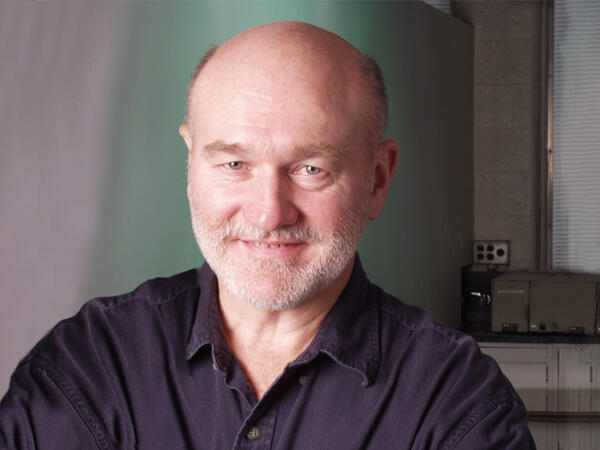
Peter
Wells
Research Contributions
Professor Peter Wells' laboratory focused on the molecular mechanisms of drug toxicities and diseases caused by the enzymatic bioactivation of relatively non-toxic drugs or endogenous substrates, including oxygen, to highly toxic reactive intermediates, including free radical reactive oxygen species (ROS), that irreversibly damage proteins and DNA. These mechanisms are completely different from the typical receptor-mediated mechanisms underlying the therapeutic effect of most drugs, and they cause some of the most severe toxicities and diseases, including organ damage, developmental disorders, cancer and neurodegeneration, which his lab has investigated over the last 45 years.
Professor Wells' early research in animal models and humans showed that glucuronidation of xenobiotics (drugs and environmental chemicals) reduces toxicity and disease by diverting substrates like the drug acetaminophen and environmental chemicals like benzo[a]pyrene away from bioactivation to a toxic reactive intermediate. His later studies in animal models showed that individual risk of toxicities and diseases like developmental disorders, cancer and neurodegeneration depends on the balance of enzymatic pathways for ROS formation (e.g., prostaglandin H synthase [PHS], NADPH oxidase [NOX]) vs. detoxification (e.g., catalase, superoxide dismutase, glutathione [GSH] peroxidase, GSH reductase, glucose-6-phosphate dehydrogenase [G6PD]) and DNA repair (e.g., oxoguanine glycosylase 1 [OGG1], breast cancer 1 [BRCA1], Cockayne syndrome B [CSB], p53, ataxia telangiectasia [ATM]). This balance is highly important, and in the fetal brain, also depended upon the ROS “sensor”, nuclear factor-E2-related factor 2 (Nrf2), that regulates levels of protective enzymes/proteins like GSH peroxidase & reductase, G6PD and OGG1. Unlike typical toxicities due to receptor-mediated mechanisms that occur primarily at excessive substrate plasma concentrations, reactive intermediate-mediated toxicities can occur in individuals with an unfavourable balance at therapeutic concentrations of drugs or supposedly safe levels of exposure to environmental chemicals. These reactive intermediate-mediated mechanisms were observed for xenobiotics like phenytoin and structurally related antiepileptic drugs, thalidomide, ecstasy and other amphetamine derivatives, ethanol, methanol and benzo[a]pyrene.
Remarkably, in the absence of xenobiotic exposure, Professor Wells showed that even physiological levels of ROS formation can be pathogenic (e.g., developmental disorders, cancer, neurodegeneration) in rodent models with a genetic or environmentally induced deficiency in enzymes/proteins catalyzing ROS detoxification (e.g., catalase, G6PD) or DNA repair (e.g., BRCA1). Conversely, in vivo treatment with stabilized versions of these enzymes was protective, even during pregnancy where the maternally administered enzyme must reach the fetus and retain its catalytic activity to be protective. On the other hand, a deficiency in a ROS-forming enzyme like PHS or NOX mitigated diseases like developmental disorders and neurodegenerative disorders.
The latter disorder was particularly complicated, where the neurotransmitter dopamine, as well as its precursor and one metabolite, were found to be substrates for PHS-catalyzed bioactivation that resulted in neurodegeneration, even though the precursor and metabolite do not bind to the dopamine receptor.
Most recently, Professor Wells' lab found that prenatal ROS-initiated DNA damage caused developmental disorders in DNA repair-deficient Ogg1 and Brca1 knockout mice by non-mutagenic mechanisms, including epigenetic changes in gene promoter methylation and histone protein methylation and acetylation, that altered gene expression. These prenatal epigenetic changes could be reversed by postnatal treatment with epigenetic modifiers that blocked neurodevelopmental disorders, suggesting the possibility of novel postnatal treatments for some of the functional components of autism, attention deficit/hyperactivity disorders, obsessive/compulsive disorders, fetal alcohol spectrum disorders and other neurodevelopmental disorders.
Professor Wells' publications have included seminal studies in journals like: ACS Chemical Neuroscience*, Antioxidants & Redox Signaling, Archives of Toxicology, Birth Defects Research*, Cancer*, Cancer Research, Chemical Research in Toxicology*, The FASEB Journal*, Free Radical Biology & Medicine, Gastroenterology; Hepatology, Journal of Biological Chemistry, Journal of Neuroscience, Journal of Pharmacology & Experimental Therapeutics, Molecular Cancer Therapeutics, Molecular Pharmacology, Nature Genetics, Nature Medicine*, Redox Biology, Toxicology, Toxicology & Applied Pharmacology, and Toxicological Sciences*(4 papers).
* paper was a finalist for a best paper award, a top downloaded paper, featured on the journal cover page, or highlighted in the journal news section.
While the Wells lab closed in December 2025, his team's final research results relating to non-mutational mechanisms by which oxidatively damaged DNA alters gene expression and initiates neurodevelopmental disorders have been presented at national and international meetings, and the manuscripts are in preparation.
Legacy & Ongoing Engagement
Research in the Wells lab was conducted by many talented graduate students, postdoctoral fellows and undergraduate research students, most of whom won highly competitive awards for their research and went on to successful careers in academia, the pharmaceutical industry and contract research companies in Canada or the U.S.A., the federal government (Health Canada, Environment Canada), the Ontario government (Ministry of Environment, Ministry of Labour), and other areas based on their expertise in molecular toxicology. Several of Wells lab alumni now work in academia and have gone on to train the next generation of graduate students who have similarly gone on to successful careers employing their expertise in toxicology. Professor Wells continues to respond to questions from the news media on subjects relevant to his expertise, and to consult with colleagues and former trainees.
Publications
Awards
- 2025 Highly Ranked Scholar-Lifetime, ScholarGPS, specialty area of phenytoin. Top 0.05% of scholars world-wide working in this specialty, ranked #2 globally. Based upon “artificial intelligence-driven analysis of the literature showing exceptional productivity, noteworthy impact and quality of scholarly work”.
- Josef Warkany Lecturer Award, Society for Birth Defects Research & Prevention (USA) (formerly the Teratology Society), February 2021. “This award recognizes a scientist who has significantly contributed to the field of teratology over his/her career. The award recipient presents a lecture scheduled as a highlight of the Society for Birth Defects Research and Prevention's annual meeting”.
- Scientific Achievement Award, Society of Toxicology (USA), Reproductive and Developmental Toxicology Specialty Section, March 2019. Awarded for “lifetime achievement or for contribution of a particularly influential body of work to the field of reproductive and developmental toxicology”.
- Gabriel L. Plaa Award of Distinction, Society of Toxicology of Canada, December 2018. Awarded for “outstanding and sustained contributions to the science of toxicology in Canada”. Lecture title: “A novel developmental role for ‘tumor’ suppressor genes in protecting the fetus from reactive oxygen species”.
- Chappel Memorial Lecturer Award, University of Guelph, Ontario Veterinary College, Guelph, Ontario, April 2015. Awarded every other year to “an internationally renowned scientist who plays a key leadership role in the biomedical sciences”. Lecture title: “Oxidative stress and DNA damage in the fetal basis of adult disease.”
- AFPC-Pfizer Research Career Award, Association of Faculties of Pharmacy of Canada, June 2011.
- Keynote speaker, 11th International Congress of Toxicology, Montreal, July 2007. One of 4 keynote speakers selected for ICT-XI, sponsored by the International Union of Toxicology (IUTOX). “Molecular mechanisms of chemical teratogenesis.”
- Keynote speaker, Brain Awareness Week, University of Saskatchewan, Saskatoon, Saskatchewan, March 2007. Public lecture: “Molecular and developmental effects of methamphetamine in the fetus.”
- Grass Traveling Scientist Award, Saskatchewan Neuroscience Network and the University of Saskatchewan, Saskatoon, Saskatchewan, March 2007. Research seminar: “Free radical determinants of neurodegenerative disease.”
- Deichmann nomination: One of two Canadian investigators nominated in March 2005 by the Society of Toxicology of Canada for the Deichmann Lecture Award for the 11th International Congress of Toxicology.
- President, Reproductive and Developmental Toxicology Specialty Section, Society of Toxicology (USA), 2001-2002.
Keywords: Behavioural disorders; Bioactivation; Birth defects; Cancer; Detoxification; Developmental disorders; DNA damage; DNA repair; Epigenetics; Genetic & environmental risk factors; Kidney damage; Liver damage; Molecular mechanisms; Neurodegenerative disorders; Neurodevelopmental disorders; Oxidative stress; Reactive intermediates; Reactive oxygen species; Toxicology

